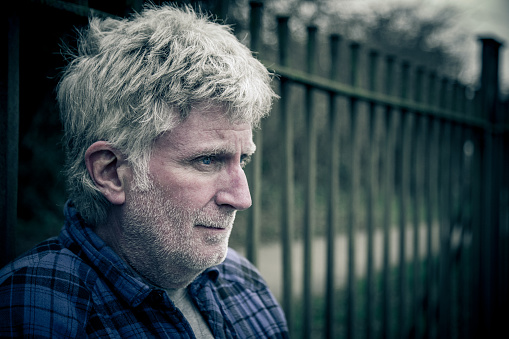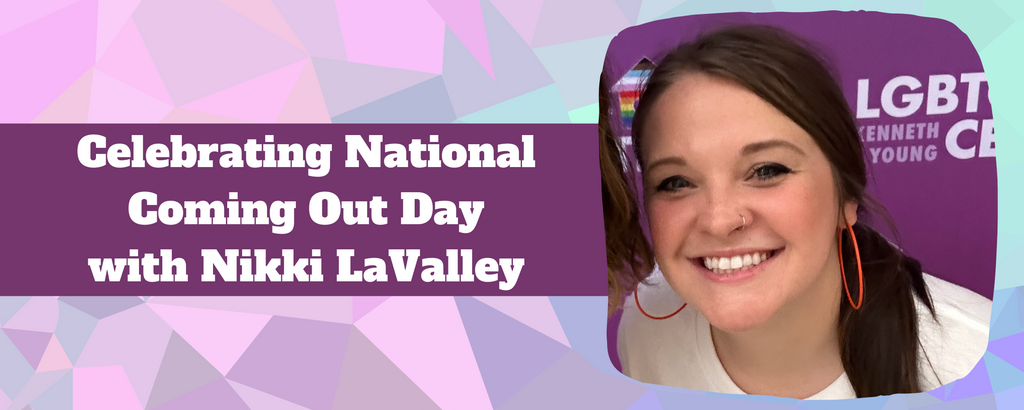
Celebrating National Coming Out Day
In honor of LGBTQ+ History Month and National Coming Out Day, Nikki LaValley (She/Her) shares some of her insight on her personal story and how it intertwines her personal mission to Kenneth Young Center programming. Nikki, who has been with Kenneth Young Center since March of 2023, just celebrated her Teammate of the Year win as Community Collaboration’s Team Lead. She oversees the many programs and weekly groups at the LGBTQ+ Center. This crucial programing includes youth and young adult nights for LGBTQ+ community members, Rainbow Room Youth Advocates for Change (RR YAC) for LGBTQ+ students and allies, to community events and outreach. She sees her role as Team Lead in her own words, “It is my dream job to be able to dedicate 40-hours a week to queer kids and to the experience of queer folks.”
Terms to Know Before Reading
Cis or Cisgender – (pronounced sis-gender): A term used to refer to an individual whose gender identity aligns with the sex assigned to them at birth. The prefix cis- comes from the Latin word for “on the same side as.” People who are both cisgender and heterosexual are sometimes referred to as cishet (pronounced “sis-het”) individuals. The term cisgender is not a slur. People who are not trans should avoid calling themselves “normal” and instead refer to themselves as cisgender or cis.
Trans or Transgender – Often shortened to trans, from the Latin prefix for “on a different side as.” A term describing a person’s gender identity that does not necessarily match their assigned sex at birth. Transgender people may or may not decide to alter their bodies hormonally and/or surgically to match their gender identity. This word is also used as an umbrella term to describe groups of people who transcend conventional expectations of gender identity or expression – such groups include, but are not limited to, people who identify as transsexual, genderqueer, gender variant, gender diverse, and androgynous. Common acronyms and terms include female to male (or FTM), male to female (or MTF), assigned male at birth (or AMAB), assigned female at birth (or AFAB), nonbinary, and gender-expansive. “Trans” is often considered more inclusive than transgender because it includes transgender, transsexual, transmasc, transfem, and those who simply use the word trans.
Queer – A term used by some LGBTQ+ people to describe themselves and/or their community. Reclaimed from its earlier negative use – and valued by some for its defiance – the term is also considered by some to be inclusive of the entire community and by others who find it to be an appropriate term to describe their more fluid identities. Traditionally a negative or pejorative term for people who are LGBTQ+, some people within the community dislike the term. Due to its varying meanings, use this word only when self-identifying or quoting an individual who self-identifies as queer.
Definitions courtesy of the PFLAG Glossary. Please visit the PFLAG Glossary for more terms and definitions.
Celebrating National Coming Out Day
October 11th of this year was the 35th celebration of National Coming Out Day. This celebration recognizes and uplifts the bravery of queer people worldwide who come out publicly and privately. National Coming Out Day also illuminates that the fight for progress and equity is not complete because many queer people still experience extreme stigma and risk when coming out.
Coming Out is a Process
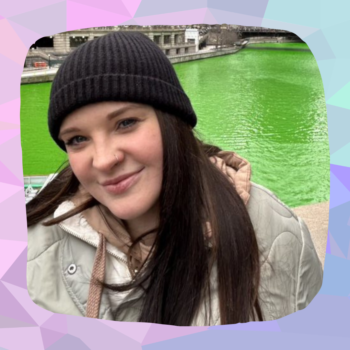
“I knew I had attraction for both boys and girls by age 10, but I only found out other people feel the same way by watching MTV, which is hilarious to think back to now. I didn’t know how to label myself at all. It really shows how confusing it is for people who don’t have access to definitions and representation.” Nikki sheds light on her own coming out story, explaining that it was a 15-year long process that doesn’t really have an end. While she experienced 12 years of questioning, by the time she got to college, Nikki had found someone with whom she connected on a deep level. She describes this pivotal relationship, “so, I found that this human was a best friend and so much more. We just really saw a lot of the world in a very similar light, and we had a lot of romantic feelings for each other. It felt like, ‘OK, now I’m really exploring this.’ When we first started dating, he identified as a lesbian.” She continues her coming out journey, “he didn’t love that, but that’s where he stood on the spectrum. Again, because we didn’t have all the language that we needed.” Over the course of their relationship, both Nikki and her partner gained insight into their shared and individual experiences. She asked herself questions like, “what does this mean for me?” while adjusting to her identity. She continues, “But while we were dating, he was learning more about himself and in that identity development, came out as a trans man. And so, this prompted me to learn more about myself. I expanded my view of gender and attraction and learned I am attracted to people across a wider spectrum than I once thought.”
Nikki touches on common experiences that many queer young people face, such as feeling unsure about your place in the world, sorting out the nuances to your identity, along with finding your community. She explains that college was a difficult period in her life which included bullying, and this only increased after she and her partner came out. “I went to a very conservative school.” She continues, “the fact we were also queer and out on campus was really hard. We both ended up transferring to another school and it was also hard there. We came out, I lost a lot of friends, and I was judged in a pretty significant way.” Nikki worked hard to quickly graduate; and with a gap of 6 months before starting her new career, she decided to fly to Europe and backpack to experience and learn more about who she is.
New Beginnings
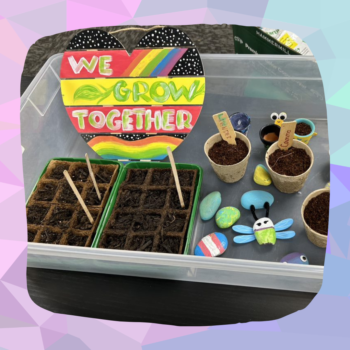
After returning home to the States, Nikki started her previous job in sales. During this chapter of her life, she realized she was struggling and decided to start therapy. “I’m having some sort of relationship with different types of people, and I don’t really know what that looks like. So, I went to therapy.” Nikki sought out a therapist with similar queer lived experience. Nikki explains that her first experience in therapy started with asking if her therapist could give her the answers to her identity. “It ended up coming to a place where she did offer thoughts of saying ‘hey, based on everything that you’re sharing with me, it sounds like you should explore what the word queer means.’ But that was actually incredibly useful to me, to recognize that there is a bit of ambiguity in that word and some beauty in that word that I can own for myself and have my own definition. I’ve maintained that authentically since I was 23 when I first went to therapy.” Starting her own exploration and journey into therapy gave Nikki the tools to come out more intimately to friends and family. “I was able to really come out to my friends and family. Because before that, I was just kind of like, ‘yes, I like everyone, I think. I don’t know.’” She emphasizes the importance of therapy helping her find the language and safety for self-exploration.
As she re-tells her story, it ends on a poignant note, “I didn’t come out to my mom until I was 25. It was amidst the pandemic, and I started dating my current partner who is a cis man. I shared that I was queer because I thought that if this relationship that really meant something to me was going to take off, then my queerness would be erased, and it wouldn’t be valued. And, if I negated the value of this relationship just to be perceived as queer, I also wasn’t living authentically.” The final piece of advice Nikki shares is, while many people may have an original coming out story, the process of coming out is continual and lifelong; many assume that their coworkers, family, and friends are straight until that moment. She also highlights that it is important to remember to stay open-minded, comfortable, and flexible with learning with a willingness to grow as identities shift and change throughout life.
Connecting with LGBTQ+ Center Programming
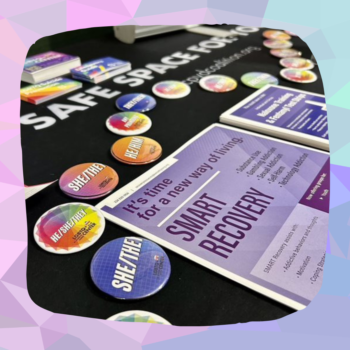
The LGBTQ+ Center’s programming has a direct and positive impact on community members, queer and allies alike. This space provides the chance for connection, education, insight, and support. For those in suburban Cook County, Kenneth Young Center provides free bus transportation to the LGBTQ+ Center. KYC also hosts many queer-inclusive, informational events on topics like sex education, legal name change process, networking, career supports, and much more!
To learn more about LGBTQ+ Center programming, bus service, and events, please call 847−496−5939 or email lgbtqcenter@kennethyoung.org. You can also check out our blog here!
Previous Article Next Article

